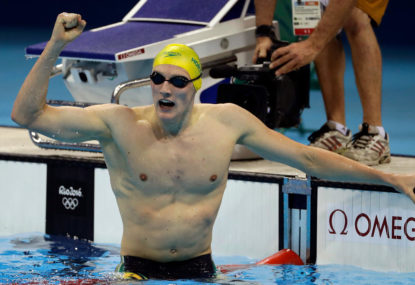'An iconic roster': LeBron, Steph, KD headline all-star cast for Team USA's shot at Olympic glory
LeBron James is going back to the Olympics for the first time in 12 years. Steph Curry is headed to the games for the…

The surprise of Australia’s Rio swimming disappointments hardly needs labouring, though it seems increasingly likely we will adopt an American late trials model, come Tokyo.
Head coach Jacco Verhaeren is defiantly dismissive of any push for changes, but this is an understandable reflex since it might prematurely tilt blame at coaches. Coaches are nothing if not politicians as livelihoods are at stake. But the inevitable review to be imposed from above will certainly have the trials’ timing as its centrepiece.
Few coaches now show serious resistance to the idea.
There have been no other compelling reasons to swap our traditional April trials for a June one, but the seeming torpor of the Rio swim team (bar the odd exception) must hint at one or two red flags.
It’s a fair bet the juggernaut saturation of social and traditional media cycles drained the team over the long Olympics build-up.
Perhaps too many distracting narratives and profiles were taken on by members under an onslaught of favourable public anticipation.
In addition, the long pre-Olympics training block bookended an equally arduous trials build-up. Eight months of unleavened slog can flatten even the most durable campaigner.
Many swimmers must have felt like they’d been to the Olympics and back by the time their plane taxied into Rio. The American team, by contrast, barely had time to look in the mirror in the few up-beat weeks between Trials and touchdown.
Of course, there may be other negative factors specific to the Australian preparation to consider. One or two journalists dubbed “precious”, the protests by Chef de Mission Kitty Chiller that swimmers had been unnecessarily inconvenienced by early morning drug testing.
Was Cate Campbell expressing veiled frustration when she gave her last on-camera poolside cheerio to family supporters back home, citing the restraints of a social media blackout imposed during the Rio stay?
One wonders whether denying young team members this intrinsic part of their daily social interaction was wise. Conventional coaching wisdom on the eve of any important competition is to avoid radically changing routine.
Mack Horton’s calling out of adversary Sun Yang as a cheat will no doubt be canvassed. If so, Chiller’s prompt endorsement may also come under the microscope, notwithstanding widespread frustration with anti-doping efforts leading into the Games.
Was it wise last year for Swimming Australia to extend Verhaeren’s contract to Tokyo, when security of tenure is the traditional enemy of rigour? Why not wait until after Rio to keep him on his toes? Will any blame be sheeted home to Swimming Australia head John Bertrand, or does the buck stop poolside?
Finally, one wonders if higher profile team members might be granted some degree of adult exemption from the hot-house inclusiveness of team building exercises.
This might mean being excused from the unending imposition of pantomimes, soul-drumming, role playing, and mime contests touring teams are seemingly inundated by these days, ostensibly in the name of creating rounded individuals.
Surely if our best athletes had aspired to be well-rounded, they would have stayed on the couch eating chips or partying, instead of dragging themselves to the local pool their entire childhood.
This recent fixation with homogeneity seems counterintuitive to the development of winners under pressure.